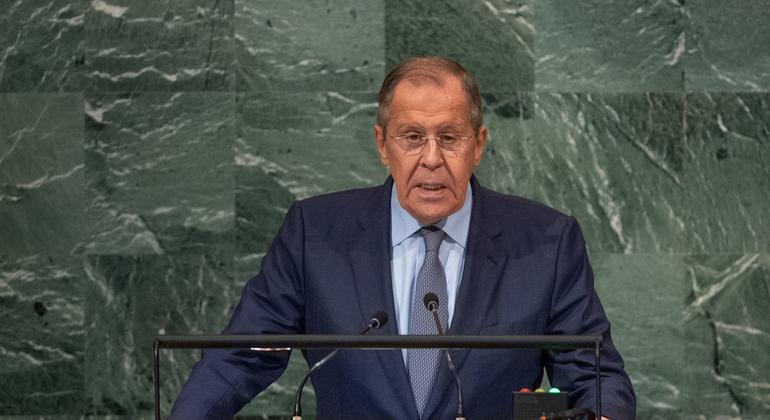Faced with the “inability” of Western countries to negotiate and the Ukrainian Government’s “war against its own people” in the east, Russia had “no choice” but to launch what the Government refers to as its special military operation, Foreign Minister Sergey Lavrov told the UN General Assembly on Saturday.
The operation launched on 24 February had been carried out to protect Russians living in Ukraine’s Donetsk and Luhansk regions, and eliminate threats to Russian security, said Mr. Lavrov, that the EU and United States-led NATO military alliance had consistently created in the territory, since what he described as the “bloody coup” by the current “Kyiv regime”, in 2014.
“I am convinced that any sovereign, self-respecting State would do the same in our stead, which understands its responsibility to its own people.”
‘Throwing a fit’
Mr. Lavrov accused the West of “throwing a fit” over this weekend’s referenda being conducted in the Donbas and other Russian-controlled areas on becoming a part of the Russian Federation, countering that people there were simply following an order from Kyiv, to “get out and to go to Russia”.
The Russian Foreign Minister said the crises surrounding the war were growing, and the international situation was rapidly deteriorating, but instead of having an honest dialogue and searching for compromise, the West was “undermining confidence in international institutions” and encouraging negative tendencies within the United Nations as well.
He said the United States was trying to turn the whole world into its “backyard”, and together with its partners, punishing dissenters from its world view, through what he called “illegal unilateral sanctions” which violate the UN Charter, and hurt poor citizens in poorer countries, targeting their medicines, vaccines and food imports.
‘Provocations’
Attempts by the US to impose dividing lines, telling nations “you’re either with us or against us”, meant that instead of “honest dialogue” there was instead “disinformation, crude staging, and provocations”.
He praised the UN Secretary-General for mobilizing efforts to overcome the global food and energy crisis fuelled by the war but blamed the West for economic mismanagement in the pandemic, claiming that sanctions against his country amounted to an “economic war against Russia.”
He praised the Black Sea Grain Initiative to free up food and fertilizer from Ukraine, and Russia, to alleviate price inflation and supply, but said the poorest countries were still not benefitting, and again criticized the US and EU for not fully removing “obstacles” to Russian exports he said were trapped in European ports.
‘Russophobia’ claim
Mr. Lavrov told the Assembly that there was now a “crusade by the West against the objectionables”, with NATO seeing Russia as simply a threat to its domination of the region and beyond.
Furthermore, Russophobia, he said, had reached unprecedented proportions, with Western powers making no secret of their ambition to militarily defeat Russia, and try to “destroy and fracture Russia…What they want to do is to remove from the global map, a geopolitical entity, which has become all too independent.”
He warned countries beyond Europe and North America, that the Western alliance, in an effort to impose its will, was seeking to expand influence and hegemony further into Asia, South America, and Africa, and ended his remarks by quoting the hugely influential and charismatic second UN Secretary-General, Dag Hammarskjöld:
Save humanity from hell
“The UN wasn’t created to take mankind to paradise, but rather to save humanity from hell. These are very topical words. They call upon us, to understand our individual and collective responsibility for creating conditions for a peaceful and harmonious development for our future generations, and everyone needs to show political will for that.”
Ending his speech on a conciliatory note, and a nod to a brighter future for multilateralism, he said he was convinced that the stability of the world order could be ensured, by returning to “the origins of UN diplomacy”, based on the key principle of “sovereign equality of States”.

